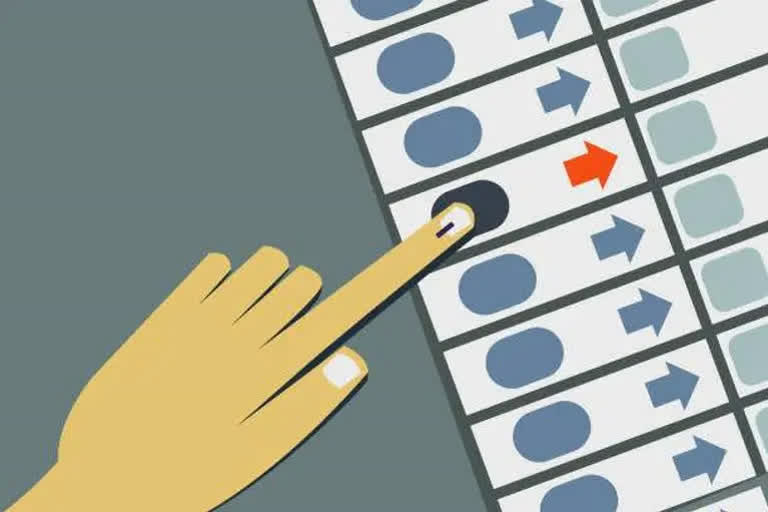Hyderabad: The year 2021 witnessed a whirlwind of high-stakes political battles where BJP's electoral dominance was at stake. The saffron party went full head of steam in its effort to expand its footprints in states where it was yet to make significant inroads.
However, it was not all about political acrimony. People saw a different side of Prime Minister Narendra Modi when he bid a teary farewell to the then Leader of the Opposition in Rajya Sabha Ghulam Nabi Azad on February 9.
Meanwhile, Uttrakhand witnessed yet another change of guard in the top post in the state with the then Chief Minister Trivendra Singh Rawat tendering his resignation, nine days ahead of completing four years in the post on March 9.
As for West Bengal, the political circle in the state was abuzz on March 10, with Chief Minister Mamata Banerjee alleging that she was attacked by unidentified men in Nandigram who slammed the car door on her resulting in injuries on her head and legs.
Despite the exodus of several senior leaders from her party to the BJP ahead of the elections, the TMC supremo successfully fended off BJP's onslaught led by Prime Minister Narendra Modi and Union Home Minister Amit Shah and became the Chief Minister for the third time in a row. TMC stormed back to power with even a larger mandate winning 213 seats while the BJP was only able to bag 77 seats on May 3.
Mamata's loss from the Nandigram Assembly constituency to BJP candidate and her former protege Suvendu Adhikari remained a cause of concern for her.
However, in neighbouring Assam, BJP retained power with a comfortable majority. While the saffron party won 60 seats, its NDA allies Asom Gana Parishad (AGP) and United People's Party, Liberal (UPPL) bagged nine and six seats respectively. The main opposition Congress bagged 29 seats.
As for Kerala, the Communist Party of India (Marxist)- Left Democratic Front (LDF) retained power and Pinarayi Vijayan became the Chief Minister for the second time.
Meanwhile, in Tamil Nadu, the DMK-led Secular Progressive Alliance won 159 out of the 234 Assembly seats in the state. DMK bagged 133 seats on its own and party president M K Stalin became the Chief Minister for the first time.
Congress received a big blow in Puducherry losing its only bastion in the south to the All-India NR Congress (AINRC) and BJP which came to power in the union territory by winning 16 out of the 30 seats. All India NR Congress chief N Rangasamy was sworn in as the Chief Minister of Puducherry.
Meanwhile, in West Bengal, a new chapter was added to Chief Minister Mamata Banerjee's strained relationship with the then BJP-led Central Government on May 28. She briefly attended a review meeting convened by Prime Minister Narendra Modi at Kalaikunda to review the damages caused by cyclone Yaas and left after handing over a few papers to him.
As for Uttar Pradesh Congress received a major jolt in the state as party leader and former Union Minister Jitin Prasada joined BJP on June 9.
Following its defeat in the West Bengal Assembly elections, BJP received another setback in the state when its national vice president and former Trinamool Congress general secretary Mukul Roy returned to Trinamool on June 11.
In neighbouring Bihar, the political landscape went through a major change on June 13 when the Lok Janshakti Party (LJP) split. Five of the LJP’s six Lok Sabha MPs rebelled against party leader Chirag Paswan (the sixth MP), son of party founder Ram Vilas Paswan and supported Pashupati Nath Paras, the late Dalit leader's younger brother. The rebel MPs ousted Chirag as the head of LJP's Parliamentary party in Lok Sabha.
As for Uttarakhand chief minister, Tirath Singh Rawat resigned on July 2, in less than four months after taking oath for the top post in the hilly state. Tirath Singh Rawat was a BJP MP from the Pauri Garhwal Lok Sabha constituency and he was sworn in as Chief Minister in March 2021. He needed to get elected as an MLA by September through by-elections, as per law.
Rawat was succeeded by Pushkar Singh Dhami who became the state's youngest chief minister.
Meanwhile, in New Delhi, a major extension was conducted in Prime Minister Narendra Modi’s Union Cabinet on July 7 with 43 leaders taking oath as ministers. This included 36 new faces and seven Ministers of State who were elevated.
As for Karnataka a change of guard also took place in the state on July 26 with BS Yediyurappa resigning as chief minister, ending months of speculation. Yediyurappa was succeeded by Basavaraj Bommai who took oath on July 28.
After Karnataka, another BJP Chief Minister Vijay Rupani of Gujarat resigned on September 11. He was succeeded by first-time MLA Bhupendra Patel on September 12.
As for Punjab then Chief Minister Captain Amarinder Singh resigned on September 18 following a bitter tiff with the State Congress president Navjot Singh Sidhu.
Singh was replaced with Charanjit Singh Channi after two days on September 20.
However, the Congress' ordeal in Punjab did not end there. State Congress chief Navjot Singh Sidhu suddenly resigned from his post on September 28, leaving the state unit in a quandary.
Coming back to West Bengal, Mamata Banerjee was able to continue in the post of Chief Minister as she won the Bhabanipur Assembly bye-election on October 3 with a record margin of 58,389 votes.
As the year drew to a close, a significant political development took place in the country with Prime Minister Narendra Modi announcing that his government will repeal the three contentious farm laws. His announcement came amid a year-long farmers' agitation in the country demanding the withdrawal of the farm laws.



